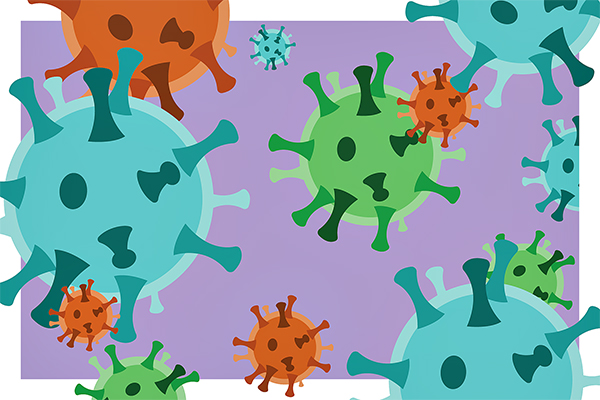Researchers at the University have continued work on multiple projects related to COVID-19, all attempting to eventually reduce the virus’s harmful effects as the number of cases in Texas increases.
The multiple research goals include improving pharmaceutical responses to the virus, projecting the number of deaths and finding the long-term effects of being infected.
A team of researchers led by Robert Williams, head of the College of Pharmacy’s Division of Molecular Pharmaceutics and Drug Delivery, developed a dry powder form of remdesivir, an antiviral drug used to treat COVID-19.
Williams said remdesivir was invented by pharmaceutical company Gilead Sciences for use against Ebola, and the company found the drug had effect against COVID-19. On May 1, the U.S. Food and Drug Administration issued an emergency use authorization for intravenous remdesivir in COVID-19 patients with severe disease.
The University research team, which includes fellows Chaeho Moon and Sawittree Sahakijpijarn, has used the lab’s technology to prepare remdesivir into an inhaled dry powder form. Williams said this allows them to administer the drug directly to the lungs, the site of infection for COVID-19.
“Our theory is it will work better at a much lower dose when administered directly to the lungs, and that’s important because this drug (is) in short supply because it takes a while to manufacture,” Williams said.
Williams said their goal is to have the drug be administered by patients at home once they are diagnosed. He said treatment would be more affordable because patients would not have to be hospitalized to receive it, could receive a lower dose and dry powder inhalers are relatively inexpensive.
The team is completing animal studies and once those results are available, they will update the pre-print release of their findings to a full peer-reviewed publication, Williams said he hopes the drug will be available for use soon.
Other researchers have been working on the UT-Austin COVID-19 Modeling Consortium, led by professor Lauren Ancel Meyers, which creates projections of COVID-19 death rates in all U.S. states and most major metropolitan areas, including Austin.
Meyers has worked on projections for pandemics for two years and was modeling for a flu pandemic before the current pandemic, according to previous reporting by The Daily Texan. A recent article in The New York Times about the risks of reopening schools featured the lab’s work.
Emily Javan, a Ph.D. student in Meyers’ lab, said the models from the UT Austin COVID-19 Modeling Consortium are included in an ensemble model by the Centers for Disease Control and Prevention. The CDC publishes an ensemble forecast using models from many groups weekly, predicting the number of COVID-19 deaths expected over the following four weeks.
"For our predictions it’s really important to understand the dynamics of the disease, like how long people are sick for, how long until they start showing symptoms, when people will get hospitalized, how long they stay in the hospital, when they would recover or be deceased,” Javan said. “Those things feed into our model structure of how we think the virus (works) and what experiences people go through when they get sick.”
Other researchers have focused on the long-term effects of COVID-19 infection. Marisa Toups, a psychiatrist at UT Health Austin, is working with Marissa Mery, a critical care anesthesiologist at UT Health Austin, and other researchers to study mental and physical health outcomes of recovered COVID-19 patients.
Toups said reports from doctors in the community and medical literature have shown patients with serious problems after recovering from the virus. She said the project aims to follow people and their immune systems to understand this trend.
“The main goal is to enroll people who have COVID in the hospital here, eventually also from the community, and to look at what happens to them over time,” Toups said. “So when they get well, or they recover from infection, do they really get well? Or do they have lingering problems?”
Toups said that people who spend time in the intensive care unit struggle to get completely well after a hospital stay and have high rates of mental illness. She said people who are depressed after they leave the hospital and have been in the ICU have a much larger chance of dying within two years of their discharge from the hospital.
“We want to raise the awareness of the pandemic as complicated and having impacts on people, not just directly because they have an infection themselves, and what happens to their body because of that, but as a complicated thing that impacts … people’s mental health," Toups said. "We recognize this is going to become more important as we have more and more people who have survived infection.”





















